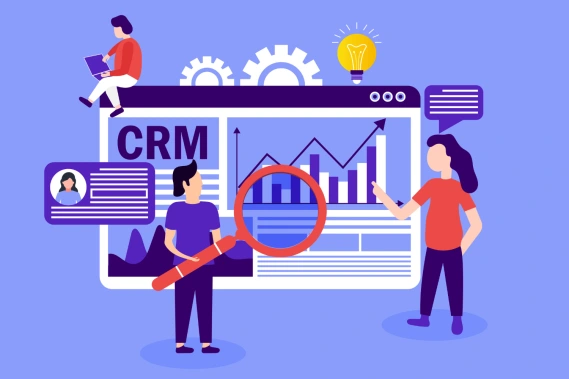Has the search for a CRM system ever made you want to scream? Have you ever just wished that someone would send a note via carrier pigeon to tell you the exact software solution you should pick?
If you answered yes to either of those questions, you’re in good company because nearly every small business team feels this way as they navigate the options for CRM and business automation platforms.
So we’re simplifying the process for you. Now, we can’t send you a carrier pigeon (bummer — I know). However, we can give you a clear list of what a CRM system absolutely needs to have. Then, you can use it to evaluate software platforms and narrow down your options until you find one that has everything your team needs.
Basics
Feature overload is a real thing. Sometimes, there are just so many to consider that it leaves you wondering what you really need and if you’ll be stuck paying for features you won’t ever use. What you need to do is eliminate the fluff and get down to the absolute basic features that every business can benefit from, and we’ve done the work for you.
Keap has served thousands of entrepreneurs and businesses of countless different niches for over 20 years, and the following list includes the small business CRM features that are most popular and impactful across industries:
- Complete business automation
- Email broadcasting
- Text messaging
- Pipeline organization
- Forms and landing pages
- Quotes, invoicing and payments
- Appointment management
- Business phone number
- Reporting
- Pre-built campaigns and automations
- Built-in AI content creation
You might not be using all these features right now, but if you’re looking to save time and generate revenue by fully automating your business and streamlining your workflows, these are things you can’t compromise on.
Migration and implementation
We’re super passionate about implementation services because far too many teams get software and aren’t given the tools or support they need to take full advantage of it. That’s why you need to spend time looking through the resources each platform offers to help you hit the ground running.
You can break this down into three main parts:
Coaching: Strategic coaching services should pair you with an expert who will talk through what you want to achieve and help set up your software so it propels you toward your goals. They’re a valuable resource to bring all your questions to, especially when you’re new to the world of CRM and business automation software.
Migration: If you’re switching from your current CRM to a new one, you’ll need to migrate all your data over to your new platform. This is a crucial step, and doing it wrong could result in losing valuable client information. That’s why you need a solid migration strategy, and the new software you choose should have one. In an ideal world, you’d get a migration specialist in your start-up services plan to help you out, so keep your eyes peeled for platforms that offer migration support. It’ll save you the added hours and stress that come with migrating everything yourself.
Ongoing support: After you’re migrated and trained in the software, chances are you’ll still need help every now and then, so you want to make sure it's readily available when that time comes. Do some digging and see what ongoing support is offered for each software you’re considering, but pay special attention if they offer multiple packages because the support could differ based on each option. Some questions to ask include:
- Does ongoing support cost extra?
- Does the package come with chat, phone, and email support?
- Is support available 24/7?
Growth potential
Every time you switch software providers, it costs you. This isn’t meant to discourage you from switching — it’s necessary if you’re not happy with your current platform. However, it shouldn’t become routine because it’s often expensive and time consuming to do so.
This just makes it all the more important for you to find the right CRM software for your business. And to avoid the need to switch again soon, it’s best to find a platform that can grow with your business. Here’s what to consider:
Capacity: Does the software have features you’ll need down the road as your business grows (even if you don’t need them now)?
Cost: Will the price of my software increase when I have more contacts in my CRM system, more users or greater email volume?
Innovation: Does the platform routinely release updates and new features?
Learning opportunities
As new strategies, trends and software features get released, your team may want to stay on top of things. The problem is, those educational opportunities can get expensive, but a good workaround is to choose software with a built-in learning program you can take advantage of.
Look for platforms that offer webinars, on-demand classes, live training sessions, guest speakers, in-person events and more. Some of these will be included in your subscription, but others might come with an additional registration fee. Just make sure their options fit within your team’s budget and they offer a mix of learning styles and topics for you to choose from.
![]()
Pro tip
Another educational tool that’s often overlooked is a user community. These communities can offer tons of collaboration, networking and learning opportunities as fellow users share their tips and tricks.
Time to shop
You’re now armed with information to help you find a well-rounded CRM software, so feel free to shop until you drop with confidence. And don’t forget to add Keap to your list of options to look into. Schedule a free call with one of our business growth experts who can further explain how Keap measures up to this feature list and answer any questions you have.


